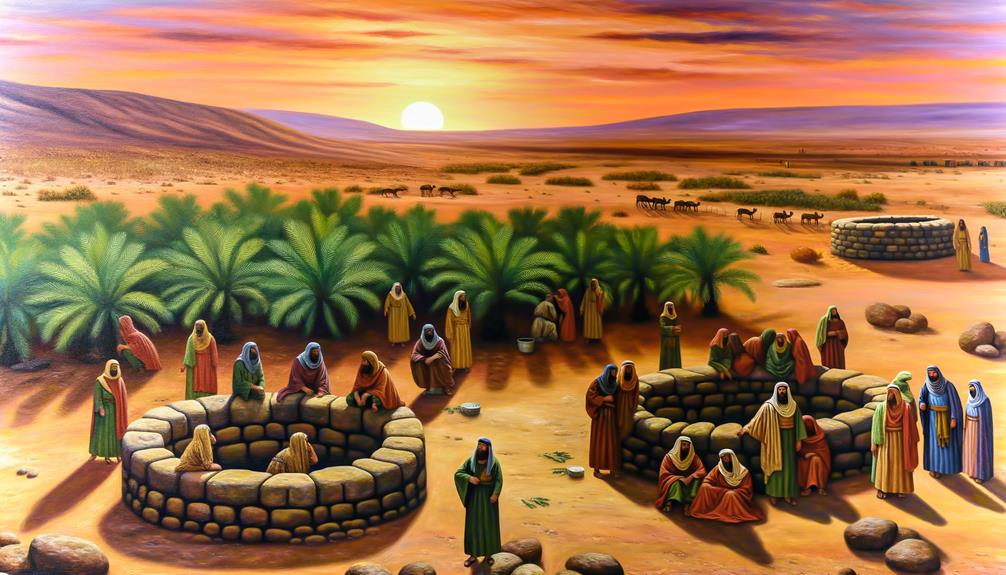Meaning of Beersheba in the Bible: Well of Oath
Beersheba, a significant biblical location, derives its name from Hebrew words meaning “well of seven” or “well of the oath,” reflecting its association with pivotal covenants in the narratives of Abraham, Isaac, and Jacob. This city symbolizes divine promise, sustenance, and human commitment, as exemplified in Abraham’s treaty with Abimelech and Isaac’s well disputes.
Located on the southern boundary of ancient Israel, Beersheba also features prominently in prophetic admonitions against idolatry and in archaeological findings, underscoring its historical and theological relevance. To grasp its complete significance, one can explore further into its multifaceted biblical contexts and legacy.

Meaning of Beersheba in the Bible: Name, History, and Spiritual Significance
| Aspect | Details |
|---|---|
| Name | Beersheba |
| Meaning | Well of the Oath or Well of Seven (Hebrew: Be’er Sheva) |
| Biblical Reference | Genesis 21:31, Genesis 26:33 |
| Key Figures | Abraham, Isaac |
| Historical Significance | Place of covenant between Abraham and Abimelech |
| Spiritual Symbolism | Symbolizes covenant, peace, divine promise, and provision |
| Geographical Importance | Southern boundary marker of Israel (“from Dan to Beersheba”) |
Etymology of Beersheba

The etymology of Beersheba, a name of significant historical and theological importance in the Bible, reveals insights into its roots in ancient Semitic languages and its contextual meanings within biblical narratives.
Derived from Hebrew, ‘Beersheba’ combines two elements: ‘Be’er’ meaning ‘well,’ and ‘Sheba’ which can denote ‘seven’ or ‘oath.’
This duality reflects both the area’s abundant wells and its association with covenants.
Historically, the term captures the essence of survival and sustenance in arid regions, while theologically, it underscores themes of divine promise and human commitment.
Understanding its etymology provides a foundation for appreciating Beersheba’s roles in biblical stories, enhancing our grasp of its multifaceted significance within the ancient world.
Beersheba in Genesis

In the Book of Genesis, Beersheba emerges as a significant location through pivotal events such as Abraham’s covenant with Abimelech, which underscores themes of peace and mutual recognition.
Isaac’s well dispute at Beersheba further highlights the region’s importance in sustaining life and ensuring prosperity in a desert landscape.
Additionally, Beersheba serves as the starting point for Jacob’s journey, symbolizing a change and divine promise that threads through the patriarchal narratives.
Abraham’s Covenant With Abimelech
Within the narrative of Genesis, Abraham’s covenant with Abimelech at Beersheba marks a significant moment of diplomacy and divine promise.
This episode in Genesis 21:22-34 highlights a formal agreement between Abraham and the Philistine king Abimelech, ensuring mutual respect and the non-aggression over disputed water rights.
This covenant is sealed by Abraham’s offering of seven ewe lambs, giving the location its name, Beersheba, meaning ‘Well of the Oath’ or ‘Well of Seven.’
- Historical Context: Reflects ancient Near Eastern practices of treaty-making.
- Diplomatic Relations: Showcases peaceful coexistence between different tribes.
- Theological Insight: Emphasizes God’s provision and Abraham’s faith.
Isaac’s Well Dispute
Isaac’s well dispute at Beersheba, detailed in Genesis 26:17-33, underscores the ongoing challenges of resource allocation and territorial rights among ancient tribes, while also reaffirming divine favor and covenantal continuity.
In this passage, Isaac encounters conflict with the Philistines over several wells, a critical resource in the arid region. Each dispute highlights the tension between survival needs and territorial claims.
Ultimately, Isaac’s perseverance and God’s reaffirmation of the Abrahamic covenant lead to the establishment of a well at Beersheba, signifying peace and divine provision.
This episode not only reflects the socio-economic realities of the time but also emphasizes God’s unwavering promise to bless Isaac, ensuring the prosperity and continuation of his lineage.
Jacob’s Journey Begins
As a pivotal location in the biblical narrative, Beersheba serves as the starting point for Jacob’s transformative journey, marking a significant shift in his life and the unfolding of God’s covenantal promises.
In Genesis 28:10, Jacob departs from Beersheba, following his father’s instructions to seek a wife from his mother’s family.
This journey not only signifies a physical movement but also a spiritual change, as Jacob encounters God at Bethel, receiving the divine promise of land and descendants.
- Historical Context: Beersheba was a key settlement in southern Canaan.
- Theological Insight: The journey underscores God’s faithfulness to Abraham’s lineage.
- Narrative Significance: Jacob’s departure initiates his role in Israel’s patriarchal history.
- Symbolic Meaning: Beersheba represents obedience and the beginning of divine encounters.
Abraham and Abimelech

The interaction between Abraham and Abimelech at Beersheba is foundational for understanding the site’s biblical significance.
Their covenant of peace, marked by the exchange of seven ewe lambs, signifies a mutual recognition of rights and responsibilities, culminating in the naming of the location as the ‘Well of Oath.’
This episode not only highlights the importance of treaties in ancient Near Eastern culture but also underscores the theological theme of God’s provision and faithfulness.
Covenant of Peace
In the biblical narrative, the Covenant of Peace between Abraham and Abimelech symbolizes a significant moment of diplomatic and theological importance, where both leaders agreed to a mutual non-aggression pact at Beersheba. This event, detailed in Genesis 21:22-34, underscores the principles of coexistence and mutual respect in a region often fraught with conflict. By establishing this covenant, Abraham and Abimelech set a precedent for peaceful resolution of disputes and divine acknowledgment of agreements.
The historical context of the pact occurred during a period of territorial disputes and water rights issues.
The theological insight gained from this covenant reflects God’s endorsement of peace and justice.
Its diplomatic importance highlights early examples of international diplomacy. Furthermore, Beersheba’s role becomes significant for future generations.
Seven Ewe Lambs
Integral to the Covenant of Peace was the unique exchange of seven ewe lambs, a gesture by Abraham to Abimelech that both solidified their agreement and underscored the cultural and theological significance of Beersheba.
This act is chronicled in Genesis 21:28-30, where Abraham’s offering of the lambs served as a tangible witness to their pact, emphasizing trust and mutual recognition.
Historically, the number seven symbolizes completeness and divine perfection in ancient Near Eastern traditions, further enriching the narrative.
Theologically, this exchange reflects themes of reconciliation and divine providence, as the lambs epitomize sacrificial dedication and covenantal fidelity.
Consequently, the seven ewe lambs are not merely a contractual formality but a profound indication of enduring peace and divine orchestration.
Well of Oath
Abraham’s encounter with Abimelech at the Well of Oath, as detailed in Genesis 21:31, marks a significant moment of covenantal assurance and territorial demarcation in biblical history. This event underscores the importance of oaths and agreements in establishing peaceful coexistence and defining boundaries.
The well, named Beersheba, which translates to ‘Well of the Oath’ or ‘Well of Seven,’ symbolizes mutual recognition and respect between the patriarch Abraham and the Philistine king Abimelech.
- Covenantal Assurance: The oath between Abraham and Abimelech reinforced trust and cooperation.
- Territorial Demarcation: Defined clearer boundaries, reducing potential conflicts.
- Biblical Significance: Highlights the role of oaths in biblical narratives.
Isaac’s Encounter

Isaac’s encounter at Beersheba is frequently highlighted as a pivotal moment of divine reassurance and covenantal renewal in biblical history. After facing numerous challenges, including conflicts over water rights, Isaac arrives in Beersheba, where God appears to him, reaffirming the promises made to Abraham.
This theophany underscores God’s ongoing commitment to Isaac, fortifying his role in the Abrahamic covenant.
The historical context reveals Beersheba as a significant location for patriarchal narratives, symbolizing divine-human interaction and territorial legitimacy. Theologically, Isaac’s experience in Beersheba epitomizes the continuity of God’s promises, emphasizing themes of faithfulness and divine provision.
Here, Isaac establishes an altar, solidifying Beersheba’s status as a sacred site of worship and covenantal affirmation.
Jacob’s Journey

Jacob’s journey to Beersheba marks a significant phase in his life, encapsulating themes of divine encounter, covenantal continuity, and the fulfillment of ancestral promises.
As Jacob departs from Beersheba, he is reassured by God’s presence, echoing the divine encounters experienced by his forefathers, Abraham and Isaac.
This journey highlights the theological importance of Beersheba as a place where God’s promises are reaffirmed and covenantal relationships are strengthened.
Beersheba consequently serves as a geographical and spiritual anchor in Jacob’s narrative, bridging his past and future.
- Divine reassurance: God reassures Jacob of His presence and promises.
- Covenantal continuity: The journey underscores the ongoing Abrahamic covenant.
- Ancestral significance: Beersheba ties Jacob to his forefathers.
Beersheba in the Exodus

Beersheba plays a pivotal role in the narrative of the Exodus, serving as a symbol of divine provision and guidance as the Israelites journey from slavery in Egypt towards the Promised Land.
Historically, Beersheba marked the southern boundary of the land of Israel, representing a significant waypoint in the Israelites’ arduous trek.
Theologically, it underscores God’s faithfulness to His covenant people, providing sustenance and direction in desolate times.
The mention of Beersheba in the context of the Exodus highlights its importance as a landmark of divine encounters and reassurance.
It embodies the shift from oppression to liberation, reinforcing the spiritual journey that parallels their physical migration, ultimately leading them to a land flowing with milk and honey.
Tribal Allotments

In the context of tribal allotments, Beersheba holds significant historical and theological importance, situated within the territory of Judah as delineated in the Book of Joshua.
Additionally, the inheritance of the tribe of Simeon, which was enveloped by Judah’s land, underscores the strategic and spiritual relevance of this area.
These territorial assignments not only illustrate the distribution of land among the Israelites but also reflect broader themes of covenant and divine promise in biblical narrative.
Judah’s Inheritance
The allocation of land to the tribe of Judah, as outlined in the biblical texts, is a significant event that highlights the historical and theological importance of territorial inheritances among the Israelites.
Judah’s inheritance, detailed in the Book of Joshua, encompasses a vast region, including key cities like Hebron and Beersheba.
This allocation not only underscores the tribe’s central role in Israel’s history but also sets the stage for its future leadership, as evidenced by the prominence of King David, who hailed from Judah.
- Historical Context: Judah’s land was strategically essential.
- Theological Significance: Symbolizes divine promise and fulfillment.
- Cultural Impact: Shaped regional identity and heritage.
- Key Locations: Hebron, Beersheba, and Jerusalem.
This inheritance laid the foundation for Judah’s enduring legacy in biblical history.
Simeon’s Territory
Following the delineation of Judah’s inheritance, the biblical narrative shifts to describe the territory allocated to the tribe of Simeon, nestled within the larger expanse of Judah’s land.
This allocation is detailed in Joshua 19:1-9, where Simeon’s portion includes Beersheba, a significant city in biblical history.
Theologically, Simeon’s inheritance within Judah’s borders fulfills Jacob’s prophecy in Genesis 49:7, reflecting a diminished status due to past transgressions.
Historically, this arrangement underscores the interconnectedness of the tribes, fostering unity among the Israelites.
Beersheba, as a key city, provided strategic, economic, and spiritual benefits, underscoring its importance in tribal narratives.
Therefore, Simeon’s territory, though smaller, played an essential role within the collective inheritance of Israel.
Beersheba in the Prophets

Prophets such as Amos and Hosea frequently referenced Beersheba, highlighting its significance as both a site of idolatrous practices and a symbol of Israel’s spiritual waywardness.
Amos 5:5 warns against seeking Beersheba, emphasizing the city’s deviation from righteous worship. Hosea echoes this sentiment, denouncing the people’s faithlessness.
These prophetic admonitions serve to underscore Beersheba’s role in illustrating Israel’s broader religious decline.
- Amos 5:5: Condemns pilgrimage to Beersheba, symbolizing misplaced faith.
- Hosea 4:15: Criticizes Israel’s unfaithfulness, mentioning Beersheba.
- Historical Context: Beersheba was a southern worship center.
This duality in Beersheba’s portrayal offers both historical and spiritual lessons.
Archaeological Discoveries

Archaeological excavations at Beersheba have unearthed significant artifacts and structures that provide a deeper understanding of its historical and religious importance in ancient Israel.
Among the most notable findings are the well-preserved remains of a fortified city from the Iron Age, including an impressive four-roomed gate complex and storied administrative buildings. These discoveries affirm Beersheba’s role as a strategic and administrative center.
Additionally, the uncovering of altars and religious artifacts suggests its significance as a cultic site. The presence of ancient wells, linked to patriarchal narratives, further underscores Beersheba’s theological resonance.
Collectively, these findings offer a rich tapestry of daily life, governance, and religious practice, underscoring Beersheba’s multifaceted role in biblical history.
Symbolism in Scripture

Beersheba’s recurring mention in the Bible symbolizes a nexus of covenantal promises, territorial boundaries, and divine-human encounters, reflecting its profound theological and historical significance.
This ancient city, often cited in narratives involving patriarchs such as Abraham, Isaac, and Jacob, serves as a tangible representation of God’s enduring faithfulness and the establishment of sacred agreements.
Beersheba also marks the peripheral limits of Israelite territory, as indicated by the phrase ‘from Dan to Beersheba.’
Its wells and altars signify moments of divine revelation and human response, encapsulating the essence of spiritual communion and commitment.
- Covenantal promises: Reflecting God’s enduring faithfulness.
- Territorial boundaries: Symbolizing Israelite limits.
- Divine-human encounters: Sites of revelatory significance.
Beersheba’s Legacy

Beersheba, often cited as the southernmost boundary of ancient Israel, holds significant historical and theological weight.
Biblically, it is a site of divine encounters—Abraham, Isaac, and Jacob each established altars there, marking it as sacred ground.
Historically, its strategic location as a trade and military hub underscores its importance.
Theologically, Beersheba symbolizes covenantal faithfulness and divine promise.
Excavations have revealed ancient wells and fortifications, offering tangible links to biblical accounts.
Consequently, Beersheba remains a pivotal reference point, enriching our comprehension of Israelite identity and their relationship with God, encapsulating both human endeavor and divine interaction.
Conclusion
Beersheba, a pivotal location in biblical narratives, symbolizes covenant, faith, and divine encounter.
The account of Abraham and Abimelech’s treaty (Genesis 21) illustrates Beersheba‘s role as a witness to human and divine agreements.
Archaeological finds affirm its historical significance, while prophetic references underscore its enduring theological import.
Like the well Abraham dug, Beersheba serves as a wellspring of spiritual and historical insights, connecting past covenants to contemporary faith practices.






